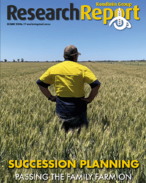This article is 7 years old. Images might not display.
Horticulture Innovation Australia and the CSIRO are working with growers to turn imperfect-looking vegetables into nutrient-rich snacks and supplements.
As part of the project, researchers are investigating the use of separation, extraction and stabilisation technologies to create products that can be sold as powders, concentrates or vegetable-dense snacks for children.
Horticulture Innovation chief executive John Lloyd said the project is investigating how good nutrients, or phytonutrients, can be drawn from carrots, broccoli and other vegetables.
“Limiting the amount of produce left in the field and offcuts cast aside during processing is a priority for industry because there’s so much potential there. On top of this, Australians are not eating enough vegetables,” Lloyd said.
CSIRO chief research scientist Dr Mary Ann Augustin said research shows farms can lose up to 40 per cent of produce and growers are keen to see this stop. For that reason, and because it has great health benefits, fermentation of vegetables is also a significant area of focus of the project.
“Fermentation is a great natural way of delivering the good bacteria through food. We are investigating ways vegetables lost in the food supply can be processed and presented in a consumer-friendly manner because it has huge health benefits,” Dr Augustin said.
Dr Augustin said feedback from growers is that processing plants need to be more accessible as many producers cannot justify the expense of freighting unused produce long distances.
“We are also looking into the interest in setting up processing hubs in key growing regions to make it easier for growers to process their underutilised produce and create these high-value, nutrient-dense products,” she said.
The desired outcome is also to encourage new industries and employment based on new edible food ingredients and products from the underutilised vegetables that will provide more returns to farmers.
Chief executive of one of the largest lettuce and brassica farmers in Australia, John Said, Fresh Select, said any project that arms industry with the tools it needs to minimise produce loss is a positive.
“We are very excited by the potential of this research project and are proactively supporting this initiative to reduce food waste. It will not only benefit growers and the industry, it will also benefit the Australian population by providing high-nutrient products and improving the nation’s health,” he said.
The project is due for completion late 2018.






















